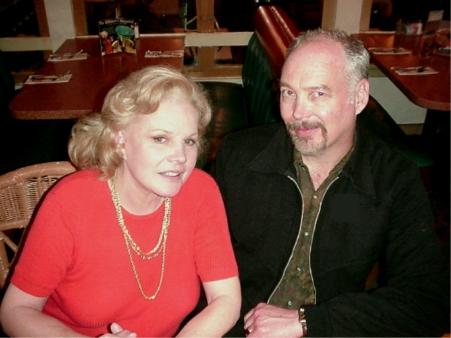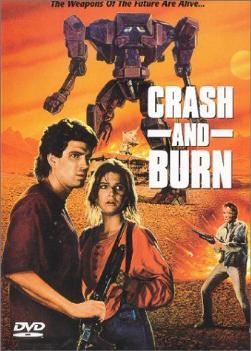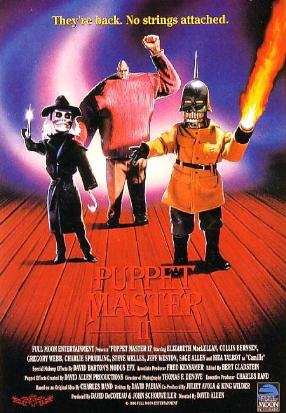|
Find interviews by: | ||
David Pabian (Part 1) Screenwriter David Pabian doesn’t have many produced credits but he’s been earning a steady living writing Hollywood scripts for many years now and the few that do have his name on are among the very best straight-to-video B-movies of the early 1990s. This interview with David was conducted in November 2007. The picture shows David with Carroll Baker, star of Andy Warhol's Bad, The Watcher in the Woods and other cult movies. Jump straight to Part 2 of this long interview
"I live here part of the time. Six months here, six months in Los Angeles. I can work here of course also, thanks to e-mail and things like that. So it’s the best of weather in LA and here, living year round in the perpetual Spring." I understand that both of your parents were animators. "As a matter of fact, they were." So how did you end up as a writer, rather than making Charlie Brown cartoons? "Because I have no talent for drawing or art! Everyone in the family actually, uncles on both sides of the family, were animators but it was not a talent that came naturally to me. I always read and was always very interested in films and film history, even as a very young kid. So it just seemed a natural thing to do, to try and make my own, and since I didn’t have the wherewithal to actually make movies I just thought I could maybe start writing them. And I did for a while as a kid, just messing around. Then I joined the real world and got an honest job at the telephone company and sat around for years doing that. But when an opening came for a reader at United Artists studios, friends of mine suggested I look into that. So that’s how I got back into the business." Did that give you an ‘in’ to be able to show your own scripts to somebody? "It did eventually, although what it really was, was upon reading all those scripts I realised that good stuff would be seen. The competition is astounding, there are thousands of scripts floating around. But I saw as a reader, and speaking with some of the executives, that the good stuff is seen, is held onto. There are scripts that film executives cart around with them for years, trying to get made. And when you get down to the pool of the quality stuff - there’s not that much, there really isn’t. I knew that I had some facility for writing and I thought I could get back into doing that. Then eventually, when I moved into a more executive development position, that’s when I began meeting people and was able to show my stuff to a few agents. It was an agent who told me that there was a writing job at Charlie Band’s company Full Moon that she couldn’t recommend any of her writers for as she was a signatory with the Writers Guild. Charlie didn’t want to use any Guild writers of course. At that time I was not a member of the Guild, so I sent in a couple of scripts, he called me up and that was it." What was the first thing that you did for Charlie? "The first thing I did was called Crash and Burn. He actually had a script called Crash and Burn and he told me that it was one of the few scripts that he had actually made a Writers Guild deal on so he was contractually obligated to use that writer’s name. But he wanted a total page one re-write and they would up giving me, I think it was ‘dialogue coach’ as a credit at the end! So along with Crash and Burn, he also then hired me top write Puppet Master II."
"It really wasn’t. I do remember him talking about that but I don’t think he wanted it to be. He had actually gotten the Crash and Burn script, I think, before Robojox but by the time it got made I believe it came out afterwards. I’m not sure on that. I was not aware of that at the time and he had had Crash and Burn for at least a year or two before he finally got around to getting somebody to rewrite it." What sort of instructions were you given about limitations such as effects sequences? "He did tell me to use all the characters and only the characters that existed in the first script. But I remember there were two women in there who were hookers and he thought that they were far too over-the-top and vulgar so he wanted them toned down. They also were drug-users, they were always high in the original story, and he didn’t want them to be drug-users. I didn’t exactly turn them into nuns but I softened them very much. I softened them and had one sort of a world-weary women of the street, who has moved out of it, and the younger women, rather than her protégé, she is now trying to get out of that life. I remember when I turned in the first draft, Charlie’s wife Debra read it and she said, ‘Where’s that line about looking for the mindfucking drugs?’ Right away I had to put back the line about: ‘You got any good mindfuckers around here?’! Which I never thought was a particularly funny line. But I was told to soften the girls and then the first comment was: why aren’t these girls tough whores? But the effects, actually at that time he said nothing about keeping the budget in mind. I think he just figured that he and David Allen would figure it out in post-production. They actually did a pretty good job for the kind of stop-motion stuff it was, I thought." How familiar were you with Charles Band’s work before you started working for him? "Actually I knew some of the work of his father, Albert Band, who had directed some interesting small films in the fifties. A very creepy, odd movie called Face of Fire with James Whitmore which was based on a Steven Crane short story, ‘The Monster.’ Other things that Albert had done, he seemed like a pretty interesting guy. I barely knew Charlie’s work when I was hired. My job at the time, as a development executive, I just wasn’t looking at that kind of stuff. It was sort of under the radar. Though I really had the idea myself of putting together a company where we would do low budget horror films. But I wasn’t that familiar with what was coming out of Full Moon - or Empire I guess it was, before Full Moon. I had seen some of his stuff but I hadn’t followed him in any way." Where did Puppet Master II come from? "Charlie said that he wanted a sequel but I was not to worry about anything that happened in the first one except in the vaguest of ways. They of course wanted to keep the puppet characters and of course Andre Toulon - although Charlie wasn't pleased with Leech Woman and wanted her killed off, so I did that - but anything else was completely up to me. He didn’t care if it didn’t match at all. I had actually seen the first one before we even talked about this and I thought that storywise it could have been a little punchier. Charlie had also told me that, no matter what I came up with as a story, he would be taking story credit as he did on all his films - and I figured okay, fine. But you got it - you mentioned somewhere in your review - that was very heavily influenced by the Karl Freund Mummy from 1932. I did that on purpose, I thought of it as an homage. I love that film so much. "And I was very pleased actually that David Allen followed the script. There were only a couple diversions. Not only did he follow the script as written but he absolutely followed my directives: when to go to black and white; cut to a poster and fade from that poster to the next screen. I was really pleased that he did that because we seemed to be very much on the same page - if I may use the word! - artistically on that film. He saw it very much the same way I did, except I did see the whole thing moving a little faster than he directed it. It’s the only feature that David Allen directed. Did he want to direct more films? "Yes, he was set to do another one called The Primevals and actually was in pre-production on it and the deal was ready to go. There may have even been one or two scenes shot when he died." Charlie Band tend to reuse people. Did David Allen not want to do any more films and concentrate on effects? "No no no, he definitely wanted to direct more and it was only his death that stopped this. He got very sick, I mean he was obviously sick for quite some time before he actually left us. But Charlie and he had a whole little roster of films that, at least at the time, Charlie had told David he was willing to let him direct. And David was working in pre-production on things. I lost track of David actually before he died. I didn’t see David much after Puppet Master II. I would stop by his studio on occasion, which was an amazing place, and we would just talk and jaw. David would often be booming Wagner from his high-end stereo all day - 12" vinyl, as he didn't like the CD remasters. I don't know what his assistants thought of Brünnhilde's top Cs, but the over-the-top mythology of Wagner's Ring obviously inspired him and his work. But I could see he wasn’t well, then whatever he was planning with Charlie did fall apart."
"It was successful. Actually I think there was only a couple of other films that were released by Paramount after that. Charlie got into some trouble apparently with them, in some way." I think we’ll hedge round that a bit! "But it was well received. It actually got some good reviews and I got some jobs from it, not from the script but from people who saw the film. It was extremely successful but of course it was also straight-to-video and I think Charlie always had pretty much a guaranteed box office on those things. I don’t know what it was like in Great Britain but all the video stores in Los Angeles at least had basically walls or large displays of Full Moon films. They had a real audience of 14-18 year-old guys and then older geeky types. He really connected with them and I think he had a pretty captive audience. I don’t really know, in the larger realm of things, how those films do in the world at large, outside of the Full Moon crowd. Puppet Master did really well and Charlie told me that he had won a couple of awards for Puppet Master II. Of course I was not even mentioned in those or went anywhere to receive an award. But there was a marketing company, a film-releasing company of some sort that gave Charlie an award for Puppet Master II. So he’d done well for somebody - I can’t tell you exactly who." It’s one of the first DTV sequels, around the same time as Trancers II. Now we think of Charlie as the king of the sequels, but this must have been around the time that he was just starting to realise that he could extend these films into franchises. Was that part of his plan? "We didn’t discuss his long-term plans. I didn’t know that when I did Puppet Master II. By the time I did Subspecies and he showed me the poster he had, for me to write the film around the poster, he told me at that point that Subspecies was going to go on and on and he wanted to get as many films as he could from it. Shortly after I began Subspecies, I heard that a friend of mine was writing Puppet Master III so I figured that was where Charlie was going now on those things. But when I had written II, I really thought that that was basically going to be the end of the Puppet Master thing. I think they went on to ... five?" There’s seven altogether. It goes up to Part V, then Curse of the Puppet Master, then Retro Puppet Master and finally Puppet Master vs Demonic Toys. "But you know, he’s very cagey that Charlie. There was a scene in my script that was a very quick flashback to Nazi Germany. I think it lasted a page and a half in the script and he told me he was going to cut it. It was sort of important in the first draft but he said, ‘No, we just don’t want to do that, we’re going to cut that.’ So I cut it out and wrote around it it - and that is what Puppet Master III was. So he took that page and a half that I wrote and figured out how to do a whole movie out of it. So that’s what III turned into and then in fact all the Puppet Masters, at least the next two, until about V - I sort of lost track of them after that, obviously - still used that Nazi Germany background that I had given him in that first film. But he’s very good at that kind of thing. He does see the elements that are going to make a good sequel or a movie and zero in on them and realise how to exploit them to the hilt. He’s a really smart guy.” Continue to Part 2 of this long interview, where David Pabian discusses Subspecies and Dollman. | ||

 What are you doing in Italy?
What are you doing in Italy?
 What sort of response did
What sort of response did